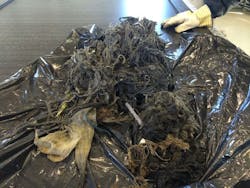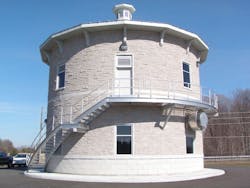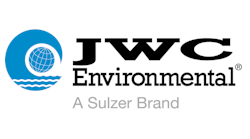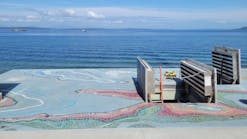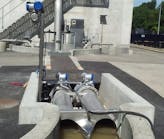Dealing with tough debris and clogged pumps and pipes are significant and costly issues for many municipal public works departments. These problems are escalating in many places the world over due to the growing popularity of flushable wipes products, as well as aging facilities and a lack of funding for sewer and utility systems. These issues can cost extensive amounts of downtime and capital due to frequent maintenance, equipment repairs and unscheduled shutdowns.
The City of London, ON, was recently facing all these problems at one of its pump stations. The city’s operations and maintenance department staff wanted a solution that was reliable, effective and easy to maintain.
Wonderland Pumping Station
Home to more than 380,000 people, the growing City of London is located just north of Lake Erie and the United States border. The city operates six wastewater treatment plants that are located along the Thames River and 35 pumping stations throughout the city.
The Wonderland Pumping Station, constructed in 2010 and located on Dingman Road, is one of the largest stations by volume in the City of London, with a rated capacity of 45,500 cu m/day. The station includes two grinders for influent sewage and four 160-KW, 320-L/second submersible pumps installed in separate wet wells, with each pump discharging through a 400-mm pipe to a common 750-mm header. All pumps are controlled by variable frequency drives. The header is connected to a 750-mm PVC force main that discharges approximately 4 km northeast of the station.
Frequent Clogging
When the Wonderland Pump Station was originally built in 2010, the operations and maintenance department worked with Envirocan, a local manufacturer’s representative for JWC Environmental, on a preventive solution to protect the pumps. The company suggested two Channel Monster grinders, and for the first three years of operation, the grinders provided adequate pump protection against tough debris. Starting in 2013, however, the makeup of the sewage at the station began to change. There was an ever-increasing amount of wipes and rags in the wastewater stream, and they proved to be a challenge for the grinders to handle effectively.
While the Channel Monster grinder would easily process the waste, the configuration of the cutters turned the newly introduced wipes into long, stringy bits of debris that would twine together and build up in the wet well.
“The grinders were doing their job, but this material just doesn’t dissolve,” said Gary Burrows, operations supervisor for the City of London. “We were having an insurmountable amount of rags weaving in our wet wells.”
The staff often had to spend time unclogging the pumps and clearing the wet well to keep the pump station operational. This “weaving” of long, stringy pieces of materials in the wet well often wrapped around the cables and the pumps.
The occurrence of severe weather also seemed to intensify the issue, causing a surge in the city’s collection system that would scour the sewer mains and push debris into the pump well.
JWC Environmental discovered that this same problem was occurring at other pump stations, and it saw an opportunity to develop a new cutting-edge methodology for its products – an updated approach that followed suit with the nature of the changing debris found in the waste streams.
Grinders Built for Wipes
Due to cases such as the Wonderland Pump Station, JWC began focusing on the behavior of shredded rags and wipes in sewer pipes and wet wells, called “reweaving” – stringy bits of wipes and hair combining into “ropes” and large rag balls, or “water bears.”
The rag balls would then slow or completely clog sewer pumps. The JWC research team found that strips of wipes would rope together in the swirling action of a sewer system. To prevent this, the redesigned Wipes Ready Channel Monster and Muffin Monster models use new cutters, screening drums and operating technologies to improve debris capture rate and cut wipes into smaller pieces. Testing showed that these enhancements eliminated the formation of long strips and rag balls in test environments.
The Solution
Looking for solutions and new technologies to improve the situation, city staff discussed the maintenance and clogging issues with both JWC Environmental and Envirocan. Both companies saw this as a perfect opportunity to put the new Wipes Ready technologies to the test.
In mid-2015, JWC outfitted one of the new Wipes Ready Channel Monsters at the Wonderland Pumping Station. This model incorporates full Wipes Ready features, including 17-tooth serrated cutters and knurled spacers, as well as optimum cut-control gearing. The grinder already had perforated screening drums, which remained in place.
The dual-shafted design of the Channel Monster grinder easily shreds through rags, clothing, wood and rocks, turning them into tiny, manageable particles that pass through pipes and pumps without clogging the equipment or compromising flow. The inline units also quickly adapt into existing pipelines, saving on installation time.
The Results
In the months since the grinder at the Wonderland Pumping Station was outfitted with the enhancements and Wipes Ready technology, there have been almost no issues related to clogging or debris at the station. In addition, the cutters on the grinder are holding up well, with few signs of wear.
“The service was the best we’ve had from anyone, anywhere,” said Angelo Marcoccia, manager of maintenance. “We were very satisfied, and the end result was fantastic. The fact that Todd from JWC came out [from California] just shows how dedicated they are to their customers.”
Using expertise and knowledge gained in helping other customers with similar issues, JWC also recommended that the city begin pumping down its wet well system on a daily basis to help prevent the material and debris weaving it had been seeing in the wet wells and on the pumps and suspension cables. This practice has also helped the city reduce issues with material weaving.
“It dramatically increased our operation and cleanliness of the wet well,” Burrows said. “That shared information was very valuable to us.”
The upgrade to a grinder designed for the wipes problems at the Wonderland Pump Station allowed the city to greatly reduce maintenance time and costs. Operations and maintenance department staffers were also happy that JWC took the time to listen to and help resolve their issues. The significant cost savings, coupled with eliminating the need for operators to manually de-rag the pumps on a nearly daily basis, made this project a success.
